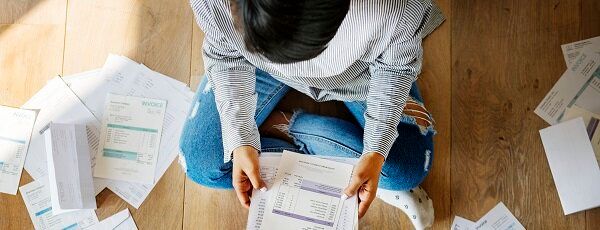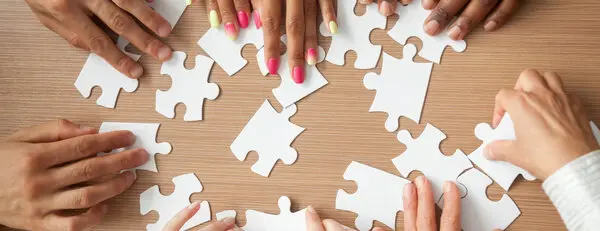Best Ways to Get Debt Relief

- Cutting expenses, improving your income, and refinancing your debt can make it easier to manage debt payments.
- Credit counselors can help you with financial education and making a plan.
- Debt settlement and bankruptcy may be options to get rid of debt for less than you owe.
Table of Contents
When it comes to getting debt-free, the right strategy can make all the difference. There are a lot of potential tools and resources that could help you take control of your finances and find debt relief.
Let's take a look at the best ways to get debt relief and start your journey to a debt-free life.
Start With the Big Picture
Before you do anything else, you need to know exactly where you stand. You need a list of your income, assets, debts, and expenses. Include minimum monthly payments and interest rates for each debt.
This process can be as simple or as involved as you want it to be, from a few lists on a piece of paper to a full spreadsheet. You can even automate it with a good budgeting app that automatically pulls up your accounts and transactions.
The goal is to know exactly how much you owe, what it's costing you, and how much you can afford to repay each month.
Decrease Your Expenses
Once you have everything in front of you, it’s easier to look for areas where you can cut back your expenses. Perhaps you'll find a streaming service you can cancel, or maybe you’ll notice you've been eating out more than you realized.
If nothing obvious jumps out, get proactive:
Shop for cheaper phone, internet, and insurance plans.
Look for ways to lower your energy bills at home. Bumping the thermostat up or down or adding window seals could make a noticeable difference.
Consider setting up an office carpool or requesting remote work to reduce commuting costs.
Use store and savings apps to find digital coupons and rebates on groceries and household goods.
Even small cuts can add up and make it easier to manage your debt payments.
Increase Your Income
An income boost can have huge positive impacts on your financial health, including your ability to manage your debts. This could be a short-term boost, such as taking on a seasonal job, or a long-term increase from a pay raise or new job.
You don't need to double your income overnight. Any extra income that goes toward your debts can help you stabilize your finances and find relief.
Refinance and Consolidate Your Debt
Refinancing is when you use a new loan to pay off existing debt. If you use the new debt to pay multiple existing debts, you're also consolidating your debt.
Debt refinancing can be a powerful tool for debt relief if you qualify for a loan or credit card with a much lower interest rate than you're currently paying. For example, if you can refinance credit card debt with an average 25% APR using a loan that charges only 10% APR, you could make headway against the debt a lot faster. That’s because at a lower interest rate, more of your payment will go towards lowering your debt instead of covering interest charges.
Your ability to find a lower APR largely depends on your credit standing. People with higher credit scores tend to receive lower interest rates.
Contact Your Creditors
You can contact your creditors directly for debt relief as soon as you realize you're going to fall behind. Your potential debt relief options depend on your personal situation and your relationship with your creditor, but it could include:
A temporary pause in payments
A lower interest rate
Lower minimum payments
Fee waivers
Creditors are more likely to offer these options to people in financial hardship, such as folks who have lost a job or gone through a recent divorce.
Consider Debt Settlement
Debt settlement involves negotiating with your creditors to get rid of your debt for less than you owe. If you experience financial hardship, debt settlement might be an option for unsecured debts like credit card balances, personal loans, and medical debt.
You can attempt debt settlement yourself by negotiating with your creditors on your own. Alternatively, you can contact a professional debt settlement company to work on your behalf. Debt settlement is for someone who truly can’t afford to fully repay their debts.
Get Help From a Credit Counselor
Maybe all you need is guidance from an experienced professional. In that case, contacting a nonprofit credit counseling agency could be a good way to find debt relief.
Credit counselors can help you organize your finances, including setting up a budget and a roadmap for paying off your debts. You can learn the skills you need to take back control of your finances and boost your financial literacy.
Get On a Debt Management Plan (DMP)
Nonprofit credit counseling agencies offer something called a debt management plan (DMP). A DMP is a structured plan to fully repay your unsecured debts within three to five years. You’ll be expected to stop using credit while you’re on the plan, and they might require you to close your credit card accounts. The credit counselor might negotiate lower interest rates and fees to help you make more headway against the debt.
If you’ve been making minimum payments on your credit cards, the DMP payment might be quite high in comparison. You make a single monthly payment to the credit counseling agency, which pays your creditors in turn.
Explore Chapter 7 Bankruptcy
If you're dealing with a lot of unsecured debt, such as credit card debt, then bankruptcy may be an option for debt relief. Bankruptcy gives you legal protection from your creditors. Chapter 7 bankruptcy lets you walk away from most or all of your unsecured debt if you qualify.
Chapter 7 is best for folks with low incomes. If you can afford a payment, you aren’t likely to qualify. You can file for bankruptcy protection on your own. Statistically, though, individual cases are far more likely to be successful with the help of a bankruptcy attorney.
Change Your Money Habits
No matter which debt relief options you use, it's important to address the reason you got into debt, so it doesn't happen again. One of the best ways to master your finances is to improve your financial education. Take advantage of online tools and resources, or seek out a professional credit counselor or financial advisor for one-on-one help.
Debt relief stats and trends
We looked at a sample of data from Freedom Debt Relief of people seeking a debt relief program during May 2025. The data uncovers various trends and statistics about people seeking debt help.
FICO scores and enrolled debt
Curious about the credit scores of those in debt relief? In May 2025, the average FICO score for people enrolling in a debt settlement program was 593, with an average enrolled debt of $26,333. For different age groups, the FICO scores varied. For instance, those aged 51-65 had an average FICO score of 589 and an enrolled debt of $28,538. The 18-25 age group had an average FICO score of 548 and an enrolled debt of $15,062. No matter your age or debt level, it's reassuring to know you're not alone. Taking the step to seek help can lead you towards a brighter financial future.
Personal loan balances – average debt by selected states
Personal loans are one type of installment loans. Generally you borrow at a fixed rate with a fixed monthly payment.
In May 2025, 44% of the debt relief seekers had a personal loan. The average personal loan was $10,718, and the average monthly payment was $362.
Here's a quick look at the top five states by average personal loan balance.
| State | % with personal loan | Avg personal loan balance | Average personal loan original amount | Avg personal loan monthly payment |
|---|---|---|---|---|
| Massachusetts | 42% | $14,653 | $21,431 | $474 |
| Connecticut | 44% | $13,546 | $21,163 | $475 |
| New York | 37% | $13,499 | $20,464 | $447 |
| New Hampshire | 49% | $13,206 | $18,625 | $410 |
| Minnesota | 44% | $12,944 | $18,836 | $470 |
Personal loans are an important financial tool. You can use them for debt consolidation. You can also use them to make large purchases, do home improvements, or for other purposes.
Tackle Financial Challenges
Don’t let debt overwhelm you. Learn more about debt relief options. They can help you tackle your financial challenges. This is true whether you have high credit card balances or many tradelines. Start your path to recovery with the first step.
Show source
Author Information

Written by
Brittney Myers
Brittney is a personal finance expert and credit card collector who believes financial education is the key to success. Her advice on how to make smarter financial decisions has been featured by major publications and read by millions.

Reviewed by
Kimberly Rotter
Kimberly Rotter is a financial counselor and consumer credit expert who helps people with average or low incomes discover how to create wealth and opportunities. She’s a veteran writer and editor who has spent more than 30 years creating thousands of hours of educational content in every possible format.
Is there a credit card debt forgiveness program?
Only Chapter 7 bankruptcy can erase a credit card debt. A debt resolution program won't entirely forgive a debt, but it's a way to negotiate with creditors so you can move forward toward a better financial future.
Does debt relief hurt your credit?
When you begin a debt relief program, it’s normal for your credit to experience a temporary step back before an even bigger step forward. People needing debt relief don’t usually go in with high credit scores. Generally speaking, the lower your score, the less it will be hurt by any negative event. Debt settlement can help you recover a good credit score sooner than bankruptcy.
What are the biggest debt payoff mistakes people make?
Avoiding help. Don’t let negative emotions or a feeling of shame cause you to hide from help. You can get free help from reputable companies online, or you can get professional help from a reputable debt settlement company or an accredited credit counselor. The smartest thing you can do is learn how to handle your money and create financial security for yourself. If you feel lost, reach out. At Freedom Debt Relief, our mission is to help you find the debt relief solution that’s right for you, even if it doesn’t include our services. If you are keeping up with your payments and don’t want a loan or debt settlement, but you can’t seem to get ahead, start by finding a nonprofit credit counselor or financial counselor. Two good places to check are the NFCC and the AFCPE®.
No budget. To get a handle on your finances, you need to be clear about the money coming in and the money going out. Your budget gives you knowledge and power. With a budget you can make an informed choice about every dollar you spend. Without a budget, you’ll be stuck on guesswork that might or might not have success.
Charging more. If you continue to use credit cards, your debt payoff will take longer. You might even chase your tail indefinitely. If you’re serious, and ready to get rid of your debt, close the credit card accounts. Keep one open for emergencies if you need to, but lock it so that it can’t be used impulsively. Use a debit card for everyday purchases.



